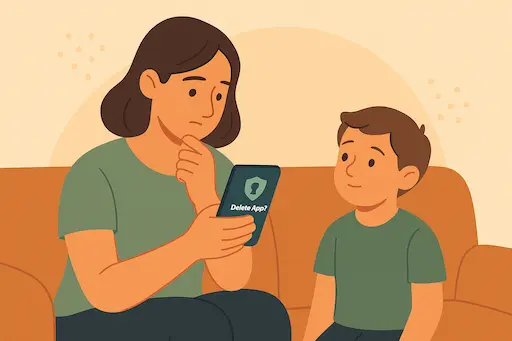Why Your Kids Should See You Delete an App
Why Your Kids Should See You Delete an App
(And Other Quiet Ways to Teach Digital Boundaries)

Modeling good app behaviour by deleting old apps.
We talk a lot about screen time limits and online safety.
But sometimes, the most powerful privacy lessons aren’t taught — they’re witnessed.
Your kids are watching how you use technology. Not just what you say about it, but what you do with it. And in a world that constantly says “more is better,” there’s something quietly radical about showing them that you can say no.
Let’s talk about why small, visible acts — like deleting an app or logging out — matter more than you might think.
Kids notice the little things
Children and teens are professional vibe readers.
They notice:
- When you put your phone down to listen
- When you say, “I’m done with this app — it’s not adding value”
- When you stop doomscrolling and go outside
- When you say, “I don’t need to know that about someone else”
You don’t need to announce it with a megaphone. Just let them see it.
“I’m allowed to set boundaries online. I don’t have to keep everything forever. I get to choose what’s worth my time and attention.”
Why deleting an app is a big deal
We’re used to adding things — new tools, new games, new socials.
But deleting something?
That’s an act of self-respect. Of clarity.
It says:
“I get to decide what belongs in my digital space.”
Whether it’s Facebook, TikTok, a shopping app, or a mindless game — when your kids see you uninstall something because it no longer serves you, that’s a real-life privacy and wellbeing lesson.
It shows them that opting out is a valid choice.
Other subtle ways to teach digital boundaries
You don’t need a script. Just a few honest, low-key moments can leave a lasting impression:
Pause before posting
Say out loud: “Actually, I don’t think I need to share that after all.”Turn off notifications
Let them see you choose peace over pings.Ask before posting their photo
“Hey, I love this photo — do you want me to post it or keep it just for us?”Talk about why you ignore some messages or emails
“This looks spammy — I’m not clicking on it.”Share your own struggles
“I noticed I was checking my phone too much, so I moved that app off my home screen.”
These aren’t lectures. They’re living examples of digital self-awareness.
You don’t need to be perfect
In fact, it helps if you’re not.
If you’ve ever said, “Oops, I shouldn’t have shared that,” or “Wow, I lost an hour to scrolling,” and then course-corrected out loud, you’re doing something powerful.
You’re modeling reflection, not just reaction. And that’s what kids need most — not perfection, but a process they can learn to use themselves.
Final thought: Be the kind of user you hope they’ll become
You don’t need a parental control app to make a difference.
You just need moments of honesty, clarity, and choice.
So go ahead — delete that app you hate.
Not to prove a point. Just because you can.
And maybe — just maybe — your kid will think,
“I can do that too.”
💡 Want more like this?
Join our free 7-Day Privacy Bootcamp — gentle, practical tips for building stronger digital habits, one day at a time.